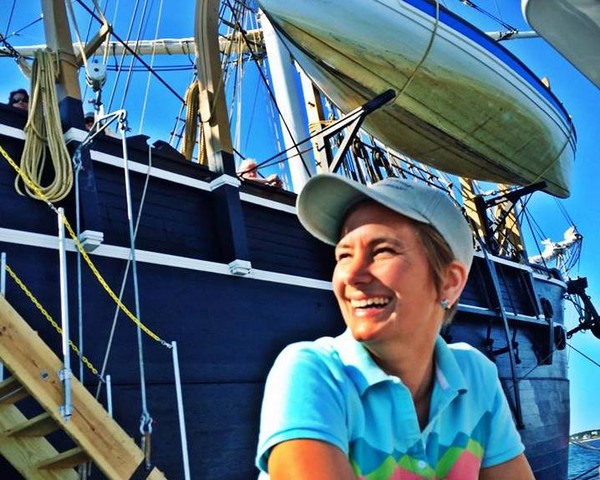
Infinite Careers is a collaboration between Career Services (CAPD) and the MIT Alumni Association to explore career paths and the non-linearity of career decision making. Read profiles of alumni with unique career paths, hear their stories and network at a series of talks.
Heather Goldstone
Education
- PhD MIT-Woods Hole Program in Oceanography
Biography
Heather Goldstone is a scientist-turned-journalist whose work introduces audiences to the excitement of discovery and the importance of science in our daily lives. She is science correspondent for WCAI and WGBH Radio, and host of Living Lab Radio, a weekly live-interview show about science and culture.
She holds a Ph.D. in ocean science from M.I.T. and Woods Hole Oceanographic Institution. Her reporting on science and the environment has appeared on NPR, PBS News Hour, The Takeaway, and PRI’s The World.
In 2014, she was recognized for the breadth of her reporting with WGBH’s Margret and Hans Rey/Curious George Producer award.
Heather’s Story
What influenced your choice of undergraduate major? How has it shaped your career choices and professional ability?
I had wanted to be a marine biologist since attending a Chesapeake Bay Foundation summer camp at age 12. I went to Kenyon College because it was small, beautiful, and had a science scholarship program. Then, I went to Australia for a year abroad in Australia and transferred so that I could fully focus on marine biology and molecular biology (and the Great Barrier Reef!).
What influenced your choice of graduate program/programs? How has it/have they shaped your career choices and professional ability?
Around the same time I decided to become a marine biologist, I decided I wanted to get my PhD in Woods Hole. The MIT-WHOI Joint Program is the way to do that. Although I am no longer a practicing scientist, the program has shaped my career because the course requirements foster a deep sense of connectedness between different fields of study and scales from global to molecular. That influences the stories I choose to cover, and also how I cover them.
What do you wish you’d done differently or more of while you were at MIT?
I’ve never really thought about that. What I did landed me where I, ultimately, love being.
What has been the most rewarding aspect of your career?
I am constantly learning, and I get to help other people share in the joy of discovery.
What motivates you to do the work that you do?
I believe deeply that science is the shared birthright of all humanity, and everyone should feel empowered to engage with science and scientists in meaningful ways beyond using cell phones and medicines. Many Americans feel estranged from science, and I want to help change that. And, I love constantly talking with smart people and learning things that influence how I live my life.
What is the biggest challenge you’ve encountered in your career? How have you managed or overcome it?
The biggest challenge was being in graduate school, knowing that it didn’t feel right, but not knowing what to do about it. It took a few years to work it out.
Making decisions, especially important-feeling career decisions, is really challenging. What strategies have you used to make career decisions?
The most important decision of my career – to leave the lab and focus entirely on radio – took me four years. I was dealing with fear of regret and guilt about “being one more woman to quit science.” In the end, I realized I needed to make a decision for myself and my family, for that point in time, not necessarily for the rest of my life. The realization that few choices are irreversible or permanent has made subsequent decisions easier. But I still take my time, and bounce ideas off of trusted friends, colleagues, and mentors. Once the decision is made, I commit fully.
What professional development experiences or opportunities shaped your early career?
My early career involved a lot of experimentation – trying different jobs until I found what felt right.
What professional development activities do you find really useful these days?
Journalism conferences, webinars.
What’s the best piece of career advice you’ve received?
Careers only look like a “path” when you get to the end and look back, and very few end up being a straight line. While you are in the middle of it, it’s more like a maze. And that’s okay.
What career advice to you have for current MIT students?
Don’t be constrained by ideas about linear career paths or what you are “supposed to do” next. Find mentors who support you – the whole you – authentically. And, remember, you can’t get what you don’t ask for. Be bold.
What does “work-life balance” mean to you, and what do you do to maintain a work-life balance?
I wear a lot of hats – journalist, parent, wife, individual, community member, friend, daughter. Work is just one part of my life, and there is no one solution to the myth of “work-life balance.” The amount of time I spend in my various roles changes constantly with my needs and goals, and the demands of the people and organizations with whom I am involved. Journaling and frequent check-ins with others are tools I use to assess what’s working, what needs more attention, and what I will prioritize each day, week, and month.
What do you like to do outside of work for fun/relaxation/inspiration?
Running, hiking, camping, yoga, reading, gardening, knitting (when I have a spare mid-winter evening).
Last edited 2019


